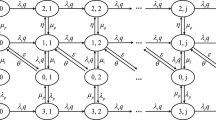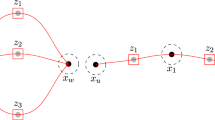Abstract
A frequent problem in settings where a unique resource must be shared among users is how to resolve the contention that arises when all of them must use it, but the resource allows only for one user each time. The application of efficient solutions for this problem spans a myriad of settings such as radio communication networks or databases. For the case where the number of users is unknown, recent work has yielded fruitful results for local area networks and radio networks, although either a (possibly loose) upper bound on the number of users needs to be known (Fernández Anta and Mosteiro in Discrete Math., Algorithms Appl. 2(4):445–456, 2010), or the solution is suboptimal (Bender et al. in ACM 17th Annual Symposium on Parallel Algorithms and Architectures, pp. 325–332, 2005), or it is only implicit (Greenberg and Leiserson in Adv. Comput. Res. 5:345–374, 1989) or embedded (Farach-Colton et al. in Theor. Comput. Sci. 472:60–80, 2013) in other problems, with bounds proved only asymptotically. In this paper, under the assumption that collision detection or information on the number of contenders is not available, we present a novel protocol for contention resolution in radio networks, and we recreate a protocol previously used for other problems (Greenberg and Leiserson in Adv. Comput. Res. 5:345–374, 1989, Farach-Colton et al. in Theor. Comput. Sci. 472:60–80, 2013), tailoring the constants for our needs. In contrast with previous work, both protocols are proved to be optimal up to a small constant factor and with high probability for big enough number of contenders. Additionally, the protocols are evaluated and contrasted with the previous work by extensive simulations. The evaluation shows that the complexity bounds obtained by the analysis are rather tight, and that both protocols proposed have small and predictable complexity for many system sizes (unlike previous protocols).




Similar content being viewed by others
Notes
For k contenders, we define with high probability to mean with probability at least 1−1/k c for some constant c>0.
We use the term unbounded to reflect that not even an upper bound on the number of contenders is known. This should not be confused with the infinitely-many users model where there are countably infinitely many stations. [6]
Througout this paper, log means log2 unless otherwise stated.
References
Anantharamu, L., Chlebus, B.S., Kowalski, D.R., Rokicki, M.A.: Deterministic broadcast on multiple access channels. In: Proceedings of the IEEE 29th International Conference on Computer Communications, pp. 146–150 (2010)
Balador, A., Movaghar, A., Jabbehdari, S.: History based contention window control in ieee 802.11 mac protocol in error prone channel. J. Comput. Sci. 6(2), 205–209 (2010)
Bar-Yehuda, R., Goldreich, O., Itai, A.: On the time-complexity of broadcast in multi-hop radio networks: an exponential gap between determinism and randomization. J. Comput. Syst. Sci. 45, 104–126 (1992)
Bender, M.A., Farach-Colton, M., He, S., Kuszmaul, B.C., Leiserson, C.E.: Adversarial contention resolution for simple channels. In: ACM 17th Annual Symposium on Parallel Algorithms and Architectures, pp. 325–332 (2005)
Capetanakis, J.: Tree algorithms for packet broadcast channels. IEEE Trans. Inf. Theory 25(5), 505–515 (1979)
Chlebus, B.S.: Randomized communication in radio networks. In: Pardalos, P.M., Rajasekaran, S., Reif, J.H., Rolim, J.D.P. (eds.) Handbook on Randomized Computing, vol. 1, pp. 401–456. Kluwer Academic, Norwell (2001)
Clementi, A., Monti, A., Silvestri, R.: Selective families, superimposed codes, and broadcasting on unknown radio networks. In: Proceedings of the ACM-SIAM 12th Annual Symposium on Discrete Algorithms, pp. 709–718 (2001)
Farach-Colton, M., Fernández Anta, A., Mosteiro, M.A.: Optimal memory-aware sensor network gossiping. Theor. Comput. Sci. 472, 60–80 (2013)
Fernández Anta, A., Mosteiro, M.A.: Contention resolution in multiple-access channels: k-selection in radio networks. Discrete Math., Algorithms Appl. 2(4), 445–456 (2010)
Fernández Anta, A., Mosteiro, M.A., Ramón Muñoz, J.: Unbounded contention resolution in multiple-access channels. In: Proceedings of the 25th International Symposium on Distributed Computing. Lecture Notes in Computer Science, vol. 6950, pp. 225–236. Springer, Berlin (2011)
Gąsieniec, L., Pelc, A., Peleg, D.: The wakeup problem in synchronous broadcast systems. SIAM J. Discrete Math. 14(2), 207–222 (2001)
Gerèb-Graus, M., Tsantilas, T.: Efficient optical communication in parallel computers. In: Proceedings of the ACM 4th Annual Symposium on Parallel Algorithms and Architectures, pp. 41–48 (1992)
Greenberg, A., Winograd, S.: A lower bound on the time needed in the worst case to resolve conflicts deterministically in multiple access channels. J. ACM 32, 589–596 (1985)
Greenberg, R.I., Leiserson, C.E.: Randomized routing on fat-trees. Adv. Comput. Res. 5, 345–374 (1989)
Gusella, R.: A measurement study of diskless workstation traffic on an ethernet. IEEE Trans. Commun. 38(9), 1557–1568 (1990)
Hayes, J.F.: An adaptive technique for local distribution. IEEE Trans. Commun. 26, 1178–1186 (1978)
Indyk, P.: Explicit constructions of selectors and related combinatorial structures, with applications. In: Proceedings of the ACM-SIAM 13th Annual Symposium on Discrete Algorithms, pp. 697–704 (2002)
Jurdziński, T., Stachowiak, G.: Probabilistic algorithms for the wakeup problem in single-hop radio networks. Theory Comput. Syst. 38(3), 347–367 (2005)
Komlòs, J., Greenberg, A.: An asymptotically nonadaptive algorithm for conflict resolution in multiple-access channels. IEEE Trans. Inf. Theory 31, 303–306 (1985)
Kowalski, D.R.: On selection problem in radio networks. In: Proceedings of the ACM 24th Annual Symposium on Principles of Distributed Computing, pp. 158–166 (2005)
Kushilevitz, E., Mansour, Y.: An Ω(Dlog(N/D)) lower bound for broadcast in radio networks. SIAM J. Comput. 27(3), 702–712 (1998)
Leland, W.E., Taqqu, M.S., Willinger, W., Wilson, D.V.: On the self-similar nature of ethernet traffic (extended version). IEEE/ACM Trans. Netw. 2, 1–15 (1994)
Martel, C.U.: Maximum finding on a multiple access broadcast network. Inf. Process. Lett. 52, 7–13 (1994)
Mikhailov, V.A., Tsybakov, B.S.: Free synchronous packet access in a broadcast channel with feedback. Probl. Pereda. Inf. 14(4), 32–59 (1978)
Mitrinović, D.S.: Elementary Inequalities. Noordhoff, Groningen (1964)
Mitzenmacher, M., Upfal, E.: Probability and Computing: Randomized Algorithms and Probabilistic Analysis. Cambridge University Press, Cambridge (2005)
Nakano, K., Olariu, S.: A survey on leader election protocols for radio networks. In: Proceedings of the 6th International Symposium on Parallel Architectures, Algorithms and Networks, pp. 63–68 (2002)
Willard, D.E.: Log-logarithmic selection resolution protocols in a multiple access channel. SIAM J. Comput. 15, 468–477 (1986)
Author information
Authors and Affiliations
Corresponding author
Additional information
A preliminary version of this work has appeared in [10]. This work was supported in part by the National Science Foundation (CCF-0937829, CCF-1114930), Comunidad de Madrid grant S2009TIC-1692, MINECO grant TEC2011-29688-C02-01, and National Natural Science Foundation of China grant 61020106002.
Rights and permissions
About this article
Cite this article
Fernández Anta, A., Mosteiro, M.A. & Ramón Muñoz, J. Unbounded Contention Resolution in Multiple-Access Channels. Algorithmica 67, 295–314 (2013). https://doi.org/10.1007/s00453-013-9816-x
Received:
Accepted:
Published:
Issue Date:
DOI: https://doi.org/10.1007/s00453-013-9816-x




